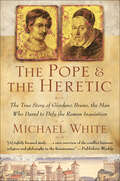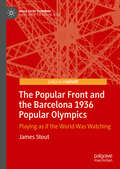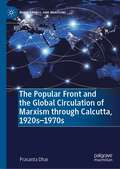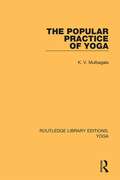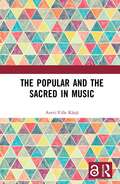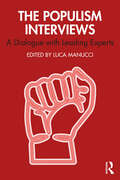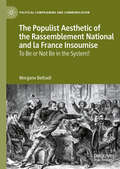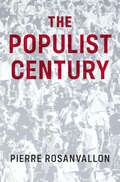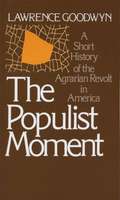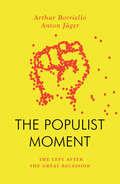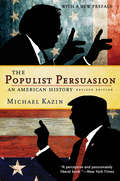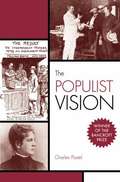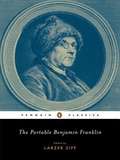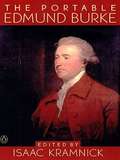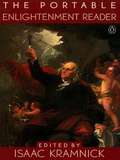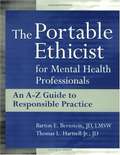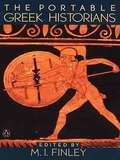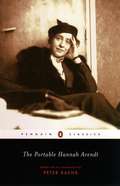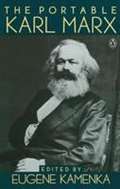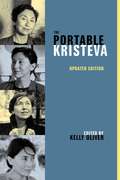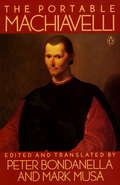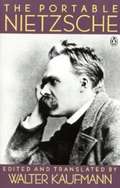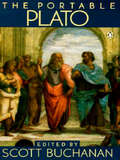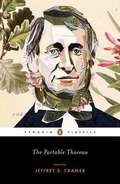- Table View
- List View
The Pope & the Heretic: The True Story of Giordano Bruno, the Man Who Dared to Defy the Roman Inquisition
by Michael WhiteThe story of the trial of visionary philosopher Giordano Bruno. “A nice overview of the conflict between religion and philosophy in the Renaissance.” —Publishers WeeklyGiordano Bruno challenged everything in his pursuit of an all-embracing system of thought. This not only brought him patronage from powerful figures of the day but also put him in direct conflict with the Catholic Church. Arrested by the Inquisition and tried as a heretic, Bruno was imprisoned, tortured, and, after eight years, burned at the stake in 1600. The Vatican “regrets” the burning yet refuses to clear him of heresy.But Bruno’s philosophy spread: Galileo, Isaac Newton, Christiaan Huygens, and Gottfried Leibniz all built upon his ideas; his thought experiments predate the work of such twentieth-century luminaries as Karl Popper; his religious thinking inspired such radicals as Baruch Spinoza; and his work on the art of memory had a profound effect on William Shakespeare.Chronicling a genius whose musings helped bring about the modern world, Michael White pieces together the final years—the capture, trial, and the threat the Catholic Church felt—that made Bruno a martyr of free thought.“White’s book is exemplary for its discussions of the period’s intellectual beliefs and social structure and for its vivid detail and illuminating look at Bruno’s trial and subsequent death.” —Library Journal“Riveting.” —Birmingham Post
The Popular Front and the Barcelona 1936 Popular Olympics: Playing as if the World Was Watching (Mega Event Planning)
by James StoutThis book deals with the events leading up to the 1936 Popular Olympics which would have united the Popular Front in opposition to the Berlin Olympics. It also discusses the days after the outbreak of the Spanish Civil War which began on the same day the games were due to start. Using a variety of primary and secondary sources, the book traces the biographies of several Popular Olympians who would go on to volunteer in the Spanish Civil War. The book also examines the planned events and locations for the Popular Olympics as well as the international funding that the games secured. The book argues that the events were a departure from Workers’ Sport as well as the IOC’s Olympic games and represented an important cultural manifestation of the Popular Front.
The Popular Front and the Global Circulation of Marxism through Calcutta, 1920s-1970s (Marx, Engels, and Marxisms)
by Prasanta DharThis book examines the global circulation of Marxism seen from one of its most highly charged sites: Calcutta in India. Building on but also revising existing approaches to global intellectual history, the book presents the circulation of Marxism through Calcutta as a historically-sited problem of mass mediation. Using tools from media studies, the book explores the way that Marxism was presented to the public, the technologies used, and the meanings of Marxism in twentieth-century Calcutta. Demonstrating how the Popular Front was split between the so-called 'people's group' and those whom were called 'intellectuals', the book argues that the people's group generally identified themselves as Marxists and preferred audio-visual media such as theatre, while the so-called intellectuals privileged academic rigour and print media, usually referring to themselves as Marxians. Thus, the author reveals a polyphony of Marxisms in the Popular Front. Tracing Marxism back to the Bengal Renaissance and the Swadeshi and Naxal movements, this book shows how debate around the meaning of 'Marxism' continued throughout the 1970s in Calcutta, and eventually engendered the historiographical movement that has come to be known as Subaltern Studies.
The Popular Practice of Yoga (Routledge Library Editions: Yoga #6)
by K.V. MulbagalaThis book, first published in 1935, is an early western study of the practice of yoga. It examines the theories of yoga, and attempts to understand and explain its philosophy and beliefs.
The Popular and the Sacred in Music
by Antti-Ville KärjäMusic, as the form of art whose name derives from ancient myths, is often thought of as pure symbolic expression and associated with transcendence. Music is also a universal phenomenon and thus a profound marker of humanity. These features make music a sphere of activity where sacred and popular qualities intersect and amalgamate. In an era characterised by postsecular and postcolonial processes of religious change, re-enchantment and alternative spiritualities, the intersections of the popular and the sacred in music have become increasingly multifarious. In the book, the cultural dynamics at stake are approached by stressing the extended and multiple dimensions of the sacred and the popular, hence challenging conventional, taken-for-granted and rigid conceptualisations of both popular music and sacred music. At issue are the cultural politics of labelling music as either popular or sacred, and the disciplinary and theoretical implications of such labelling. Instead of focussing on specific genres of popular music or types of religious music, consideration centres on interrogating musical situations where a distinction between the popular and the sacred is misleading, futile and even impossible. The topic is discussed in relation to a diversity of belief systems and different repertoires of music, including classical, folk and jazz, by considering such themes as origin myths, autonomy, ingenuity and stardom, authenticity, moral ambiguity, subcultural sensibilities and political ideologies.
The Populism Interviews: A Dialogue with Leading Experts
by Luca ManucciThe Populism Interviews features interviews with many of the leading experts on this most controversial of issues. Populism is a widely debated topic, and it generates interest across the globe. As a result, a burgeoning literature deals with many aspects of populism and its links to pressing issues such as media freedom, minority rights and separation of powers. To make sense of such a complex subject, this book presents interviews with some of the leading experts on populism at the international level. Through a dialogue with important figures, this book offers the possibility to make sense of a global phenomenon in a complete and accessible way. The first section presents different theories on what populism is and is not, highlighting the differences but also the points of contact between different approaches. The second part offers an overview of the evolution of populism through history and across continents, detailing its causes and consequences. The third part deals with issues and topics connected to populism, such as environmentalism, welfare, religion, social movements and the media. Bridging theoretical approaches and empirical studies, while considering cases across space and over time, this book offers an insightful and accessible guide to the study of populism. This volume will be of interest to all scholars, students and researchers of populism.
The Populist Aesthetic of the Rassemblement National and la France Insoumise: To Be or Not Be in the System? (Political Campaigning and Communication)
by Morgane BelhadiThis book analyses visual expressions of populism in France to provide new insights into contemporary political communication. It focuses on images produced by the Rassemblement National and la France insoumise – parties on the far right and far left respectively – as part of their political campaigns. The author explores issues such as representation, symbolism, the power of narratives, dystopian imagery and counterculture, throughout posters and social media. It highlights the strategies of these parties, particularly in relation to the use of the themes of resistance, revolution and patriotism. The book is a valuable resource for academics, students and practitioners who seek to better understand populism in France and beyond.
The Populist Century: History, Theory, Critique
by Pierre RosanvallonPopulism is an expression of anger; its appeal stems from being presented as the solution to disorder in our times. The vision of democracy, society, and the economy it offers is coherent and attractive. At a time when the words and slogans of the left have lost much of their power to inspire, Pierre Rosanvallon takes populism for what it is: the rising ideology of the twenty-first century. In The Populist Century he develops a rigorous theoretical account of populism, distinguishing five key features that make up populist political culture; he retraces its history in modern democracies from the mid-nineteenth century to the present; and he offers a well-reasoned critique of populism, outlining a robust democratic alternative. This wide-ranging and insightful account of the theory and practice of populism will be of great interest to students and scholars in politics and the social sciences and to anyone concerned with the key political questions of our time.
The Populist Moment: A Short History Of The Agrarian Revolt In America
by Lawrence GoodwynThis condensed version of Lawrence Goodwyn's Democratic Promise, the highly-acclaimed study on American Populism which the Civil Liberties Review called "a brilliant, comprehensive study," offers new political language designed to provide a fresh means of assessing both democracy andauthoritarianism today.
The Populist Moment: The Left After the Great Recession (Jacobin)
by Anton Jager Arthur BorrielloA Left-wing populist insurgency exploded across the West in the wake of the Great Financial CrisisAfter decades of retreat, the last decade saw a left resurgence from the US to Western Europe and the Mediterranean. This revival of anti-establishment left-wing candidates was not only left but also populist. Though in most cases these movements ran out of steam before effectively being in a position wield state power, many of the parties and figures associated with this wave of left populism have entered government and others are still contesting high office.Providing a blow-by-blow history of the rise and defeat of left electoral movements in the West, Boriello and Jaeger guide us through the conditions that shaped this wave of insurgencies. These include extreme and rising inequality, the collapse of civic life, and a lack of trust in traditional institutions.In this context, Boriello and Jaeger argue that some or another form of populism was all but inevitable. And, despite defeats, left offensives of present and future will be populist in nature. This is because the conditions that shaped the first left populist wave are still very much with us.
The Populist Persuasion: An American History
by Michael KazinIn The Populist Persuasion, the distinguished historian Michael Kazin guides readers through the expressions of conflict between powerful elites and "the people" that have run through our civic life, filling it with discord and meaning from the birth of the United States until the present day. Kazin argues persuasively that the power of populism lies in its adaptable nature. Across the political spectrum, commentators paste the label on forces and individuals who really have just one big thing in common: they are effective at blasting "elites" or "the establishment" for harming the interests and betraying the ideals of "the people" in nations that are committed, at least officially, to democratic principles. Kazin’s classic book has influenced debates over populism since its publication. The new preface to this edition brings the story up to date by charting the present resurgence of populist discourse, which was front and center in the 2016 elections and in the Brexit debate.
The Populist Vision
by Charles PostelThe Populist movement has been both dismissed as an irrational response of backward-looking farmers to modernity and romanticized as a resistance movement of tradition-based communities to modern, commercial society. Now, in a wide-ranging and provocative reassessment, based on a deep reading of archival sources, The Populist Vision argues the opposite - that the Populists understood themselves as, and in fact were, modern people, pursuing an alternative vision for modern America. Taking into account the leaders and the led, The Populist Vision uses a wide lens - focusing on the farmers, both black and white, men and women - but also looking at wage workers and bohemian urbanites. Ranging from Texas to the Dakotas, from Georgia to California, Charles Postel shows how farmer Populists strove to use the new innovations for their own ends. They sought scientific and technical knowledge, formed highly centralized organizations, launched large-scale cooperative businesses, and pressed for reforms on the model of the nation's most elaborate bureaucracy - the Postal Service. Hundreds of thousands of women joined the movement, too, seeking education, employment in schools and offices, and a more modern life. Miners, railroad workers, and other labor Populists joined with farmers to give impetus to the regulatory state. Activists from Chicago, San Francisco, and other new cities provided Populism with a dynamic urban dimension. The winner of a prestigious Bancroft Prize and the Organization of American Historian's Frederick Jackson Turner Award, this highly original account of the Populist movement is essential reading for anyone interested in the politics, society, and culture of modern America.
The Portable Benjamin Franklin
by Benjamin Franklin Larzer ZiffIt takes a very inclusive anthology to encompass the protean personality and range of interests of Benjamin Franklin, but The Portable Benjamin Franklin succeeds as no collection has. In addition to the complete Autobiography, the volume contains about 100 of Franklin’s major writings—essays, journalism, letters, political tracts, scientific observations, proposals for the improvement of civic and personal life, literary bagatelles, and private musings. The selections are reprinted in their entirety and organized chronologically within six sections that represent the full range of Franklin’s temperament. The result is a zestful read for Franklin scholars and anyone wanting to know and enjoy this American icon. First time in Penguin Classics Published to coincide with the 300th anniversary of Franklin's birthday The only anthology of its kind to present essays and letters of Franklin's in their entirety .
The Portable Edmund Burke
by Edmund Burke Isaac KramnickThe intellectual wellspring of modern political conservatism, Edmund Burke is also considered a significant figure in aesthetic theory and cultural studies. As a member of the House of Commons during the late eighteenth century, Burke shook Parliament with his powerful defense of the American Revolution and the rights of persecuted Catholics in England and Ireland; his indictment of the English rape of the Indian subcontinent; and, most famously, his denouncement of English Jacobin sympathizers during the French Revolution. The Portable Edmund Burke is the fullest one- volume survey of Burke's thought, with sections devoted to his writings on history and culture, politics and society, the American Revolution, Ireland, colonialism and India, and the French Revolution. This volume also includes excerpts from his letters and an informative Introduction surveying Burke's life, ideas, and his reception and influence in the nineteenth and twentieth centuries. .
The Portable Enlightenment Reader
by Various Isaac KramnickThe Age of Enlightenment of the eighteenth century, also called the Age of Reason, was so named for an exultant intellectual movement that shook the foundations of Western civilization. In championing radical ideas such as individual liberty and an empirical appraisal of the universe through rational inquiry and natural experience, Enlightenment philosophers in Europe and America planted the seeds for modern liberalism, cultural humanism, science and technology, and laissez-faire capitalism. This volume brings together the era's classic works, with more than a hundred selections from a broad range of sources--including works by Kant, Diderot, Voltaire, Newton, Rousseau, Locke, Franklin, Jefferson, Madison, and Paine--that demonstrate the pervasive impact of Enlightenment views on philosophy and epistemology as well as on political, social, and economic institutions. Included are seminal discourses on science and religion, on the social contract, on the equality (and inequality) of the sexes and the races, and on economics and markets, as well as homages to nature and sexual pleasure, and poetry and opera librettos that embody the movement's social ideals.
The Portable Enlightenment Reader
by Various Isaac KramnickThe Age of Enlightenment of the 18th century, also called the Age of Reason, was so named for an intellectual movement that shook the foundations of Western civilization. In championing radical ideas such as individual liberty and an empirical appraisal of the universe through rational inquiry and natural experience, Enlightenment philosophers in Europe and America planted the seeds for modern liberalism, cultural humanism, science and technology, and laissez-faire Capitalism This volume brings together works from this era, with more than 100 selections from a range of sources. It includes examples by Kant, Diderot, Voltaire, Newton, Rousseau, Locke, Franklin, Jefferson, Madison, and Paine that demonstrate the pervasive impact of Enlightenment views on philosophy and epistemology as well as on political, social, and economic institutions.
The Portable Ethicist for Mental Health Professionals: An A-Z Guide to Responsible Practice
by Barton E. Bernstein Thomas L. HartsellEverything you need to know to protect your practice against ethical violations and complaints. The Portable Ethicist for Mental Health Professionals is a valuable, easy-to-use resource for all mental health service providers. Written by two attorneys specializing in legal and ethical issues in mental health, this indispensable guide arms you with the expert knowledge you need to avoid an ethical violation-or to handle the situation if a complaint is filed. Barton Bernstein and Thomas Hartsell Jr. tackle dozens of ethical questions using the codes of several mental health professional associations and provide practical guidelines for avoiding ethically questionable behavior. Organized alphabetically for easy reference, this complete A-to-Z guide: Provides clear, concise answers to ethical questions-from the simple to the complex Covers key categories, including confidentiality, dual relationships, sexual misconduct, false and misleading statements, malpractice, drug and alcohol use, documentation, record keeping, closing a practice (retirement or death), responding to a subpoena, and more Features step-by-step guidance, helpful case studies, and "ethical flash points" that alert you to warning signs and help you steer clear of ethically questionable situations Covers the role of state licensing boards and national mental health associations in responding to complaints of ethical violations Even an unintentional ethical violation can lead to personal and professional disaster. The Portable Ethicist for Mental Health Professionals helps you protect yourself, your future, and your practice-and lets you focus on the best interests of your clients.
The Portable Greek Historians
by M. I. FinleyEssential passages from the works of four "fathers of history"--Herodotus's History, Thucydides' History of the Peloponnesian War, Xenophon's Anabasis, and Polybius's Histories.
The Portable Hannah Arendt
by Hannah ArendtThis biography includes generous selections from The Origins of Totalitarianism, The Human Condition, and her controversial Eichmann in Jerusalem. It also includes selection of Arendt's letters to other formative thinkers of the century.
The Portable Karl Marx
by Karl Marx Eugene KamenkaIncludes the complete Communist Manifesto and substantial extracts from On the Jewish Question, the German Ideology, Grundrisse, and Capital, a broad representation of his letters, and lesser-known works, especially his long-unavailable, early works.
The Portable Kristeva (European Perspectives: A Series in Social Thought and Cultural Criticism)
by Julia KristevaAs a linguist, Julia Kristeva has pioneered a revolutionary theory of the sign in its relation to social and political emancipation; as a practicing psychoanalyst, she has produced work on the nature of the human subject and sexuality, and on the "new maladies" of today's neurotic. The Portable Kristeva is the only fully comprehensive compilation of Kristeva's key writings. The second edition includes added material from Kristeva's most important works of the past five years, including The Sense and Non-Sense of Revolt, Intimate Revolt, and Hannah Arendt. Editor Kelly Oliver has also added new material to the introduction, summarizing Kristeva's latest intellectual endeavors and updating the bibliography.
The Portable Machiavelli
by Niccolo Machiavelli Mark Musa Peter BondanellaIn the four and a half centuries since Machiavelli's death, no single and unanimously accepted interpretation of his ideas has succeeded in imposing itself upon the lively debate over the meaning of his works. Yet there has never been any doubt about the fundamental importance of Machiavelli's contribution to Western political theory. The Portable Machiavelli brings together the complete texts of The Prince, Belfagor, and Castruccio Castracani, newly translated by Peter Bondanella and Mark Musa especially for this volume. In addition, the editors include an abridged version of The Discourses; a play, The Mandrake Root, in its entirety; seven private letters; and selections from The Art of War and The History of Florence.
The Portable Nietzsche (Portable Library)
by Friedrich Nietzsche Walter KaufmannThe works of Friedrich Nietzsche have fascinated readers around the world ever since the publication of his first book more than a hundred years ago. As Walter Kaufmann, one of the world's leading authorities on Nietzsche, notes in his introduction, "Few writers in any age were so full of ideas," and few writers have been so consistently misinterpreted. The Portable Nietzsche includes Kaufmann's definitive translations of the complete and unabridged texts of Nietzsche's four major works: Twilight of the Idols, The Antichrist, Nietzsche Contra Wagner and Thus Spoke Zarathustra. In addition, Kaufmann brings together selections from his other books, notes, and letters, to give a full picture of Nietzsche's development, versatility, and inexhaustibility. "In this volume, one may very conveniently have a rich review of one of the most sensitive, passionate, and misunderstood writers in Western, or any, literature." --Newsweek
The Portable Plato
by Plato Scott BuchananWriting in the fourth century B.C., in an Athens that had suffered a humiliating defeat in the Peloponnesian War, Plato formulated questions that have haunted the moral, religious, and political imagination of the West for more than 2,000 years: what is virtue? How should we love? What constitutes a good society?<P><P> Is there a soul that outlasts the body and a truth that transcends appearance? What do we know and how do we know it? Plato's inquiries were all the more resonant because he couched them in the form of dramatic and often highly comic dialogues, whose principal personage was the ironic, teasing, and relentlessly searching philosopher Socrates. In this splendid collection, Scott Buchanan brings together the most important of Plato's dialogues, including Protagoras, The Symposium, with its barbed conjectures about the relation between love and madness, Phaedo and The Republic, his monumental work of political philosophy. <P>Buchanan's learned and engaging introduction allows us to see Plato both as a commentator on his society and as a shaper of the societies that followed, who bequeathed to us a hunger for the ideal as well as a redeeming habit of humane skepticism.
The Portable Thoreau
by Henry David Thoreau Jeffrey S. CramerHenry David Thoreau dedicated his life to preserving his freedom as a man and an artist. Nature was the fountainhead of his inspiration and his refuge from what he considered the follies of society. Heedless of his friends’ advice to live in a more orthodox manner, he determinedly pursued his own inner bent, which was that of a poet-philosopher, in prose and verse. Carl Bode brings together the best of Thoreau’s works in The Portable Thoreau, a comprehensive collection of the writings of a unique and profoundly influential American thinker. The complete texts of Thoreau’s classic works Walden and “Civil Disobedience,” as well as selections from The Maine Woods, Cape Cod, the Journal, and eighteen poems are included. Bode’s introduction rounds out this compact volume, offering a thorough and informative analysis of Thoreau and the forces that shaped his life and writing. “This compact book, containing infinite riches in a little room, is a simple setting for sound sense, nugget-like thought, the refined essences of a point of view” — St. Louis Post-Dispatch .
